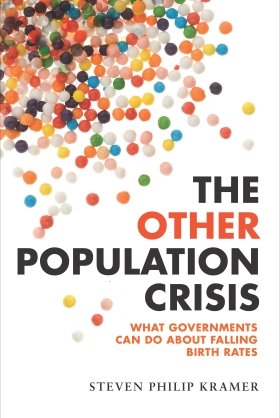The Other Population Crisis: What Governments Can Do about Falling Birth Rates

-
In many developed countries, population decline poses economic and social strains and may even threaten national security. Through historical-political case studies of Sweden, France, Italy, Japan, and Singapore, The Other Population Crisis explores the motivations, politics, programming, and consequences of national efforts to promote births. Steven Philip Kramer finds a significant government role in stopping declines in birth rates.
Sweden and France’s pronatalist programs, which have succeeded, share a setof characteristics that make it easier for women to balance work and family life. In contrast, programs in Italy, Japan, and Singapore, which have failed so far, have not devoted sufficient resources consistently enough to make a difference and do not support gender equality and women’s work-family balance. Kramer’s assessment furthermore discusses the role that successful population policies have in promoting national security, economic competitiveness, gender equality, and social welfare in the developed and developing world.
Steven Philip Kramer is professor of grand strategy at the Dwight D. Eisenhower School for National Security and Resource Strategy, National Defense University, in Washington, D.C. He was a public policy scholar at the Woodrow Wilson Center from 2010 to 2011.
Author
 Steven Philip KramerGlobal Fellow, Global Europe Program;
Steven Philip KramerGlobal Fellow, Global Europe Program;
Author "Jews, Muslims, and the French Republic" (Cambria: 2023)Browse Insights & AnalysisExplore More
Browse Insights & Analysis
What Is Next for the Women of Afghanistan?
Posted date/time:
Rompiendo barreras en la pista: Tatiana Calderón en Tres Respuestas con Iván Duque
Duration:45:19Posted date/time:

